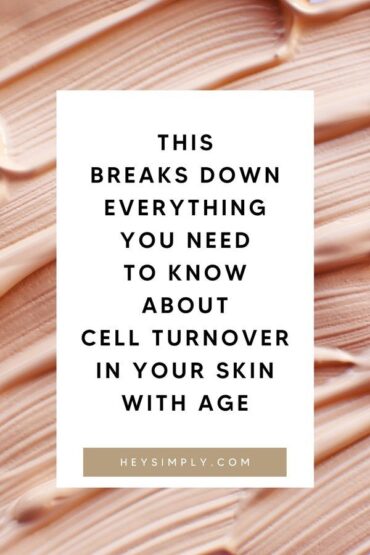
Vitamin C helps reduce pigmentation spots and brightens the skin.
SKIN CELL TURNOVER RATE BY AGE SKIN
They help diminish the appearance of fine lines, smooth hair and will absorb less moisture from your skin than a cotton pillowcase.Īge spots in your 30's is very common. TIP: Treat yourself to a good satin or silk pillowcase. Try for at least 8 hours of sleep a night. Our body’s blood circulation is boosted during sleep, bringing nutrients and oxygen to skin cells. When we don’t get enough sleep, cortisol levels can rise and our skin becomes inflamed and stressed. Our is a gentle leave on exfoliating lotion containing 10% glycolic acid (AHA) and antioxidants to help calm redness and improve skin’s texture. Now is the time to really amp up your exfoliation regime, you need to be focusing on boosting cell turnover to keep your skin looking fresh and bright. Top 3 Essential steps to care for your skin in your 30's Retinoids should also be introduced into your routine. Once you have that down pat, you should also add in an antioxidant serum that can address the free-radical damage involved in premature aging.

Establishing a routine that includes hydrating ingredients like glycerin and hyaluronic acid, along with excellent sun protection (that you've continued to use through your 20's). Now is the time to start fine-tuning your skincare routine. When female hormone levels begin to decrease, skin concerns associated with ageing become more obvious. In your late teens growth hormone levels are around 900, when you hit your 30s the level drops to around 200. Your complexion may start to look more dull.įor women, hormones are one of the largest contributors to skin changes in your 30s. Volume will decrease around the lips, cheeks and under the eyes. You may also start to see forehead and frown lines begin occurring. Your 30’s is when your skin starts to reflect ‘adult life’, this is where the fine lines become more prominent around the eyes and around the mouth. Our Pro+ Bio Soothing Day Mineral CC SPF15 is a lightweight, non-greasy physical SPF, which is perfect for every day use. It’s essential to protect our skin at all times of the year because sun exposure is always present, regardless of the season, and contributes to premature skin aging. This is a no brainer, but I repeat for the people in the back "Never sleep with your make up on!!" Our Ultra Gentle Soothing Cleanser will gently clean your skin without stripping away your natural oils. Instead opt for a gentle cleanser that balances your skins natural pH levels. Avoid harsh cleansers with drying astringents as this may cause irritation and breakouts. Top 3 Essential steps to care for your skin in your 20'sĮnsure you find the right cleanser for your skin type and get into a daily habit of cleansing your skin.

When skin starts to thin, its barrier function and its natural protection against UV also gradually reduce.Ĭollagen mass and flexibility also begin to deplete at a rate of approximately 1% a year from the age of 25. It can also cause loss of skin elasticity.

This causes dead skin cells to build up and cause discoloration. However when you reach your mid 20s your skin cell turnover starts to slow down. During this period collagen production is in its prime, this is where your skin appears plump, bouncier and has more glow. While breakouts can continue to occur from your teens they are typically less severe. In your early 20s your hormones can still fluctuate. What to Expect With Your Skin in Your: 20s

We have put together a skin timeline to show you what to expect as you age and products we recommend you incorporate into your routine. It is natural for our face to lose some of its youthful fullness and as we age we notice our skin becoming thinner and drier.Ĭhoosing the right products that will care for, nourish and protect your skin, through all stages of these changes is key to achieving your best skin that looks and feels healthy, no matter what your age is. Over time we will all get visible lines, our skin will lose elasticity and reduced collagen levels. From the delicate skin of a newborn, through to adolescence where some people can experience acne, to mid-life where hormone changes can cause adult acne, and then onwards to our mature years, our skin will inevitably go through it's natural aging process.


 0 kommentar(er)
0 kommentar(er)
